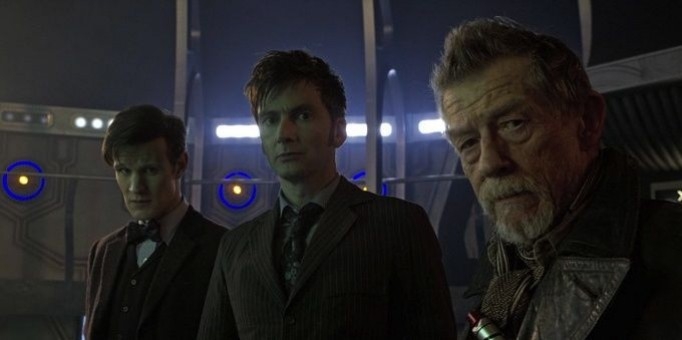
The Day of the Doctor: DVD Review
Do you have a Doctor Who fan in your family? Then this is the rectangular present they’ll be hoping to see crammed in their stocking this Christmas.
The Day Of The Doctor is the 799th episode in the epic BBC science fiction saga and a 77-minute special written to commemorate the series’ 50th anniversary. It’s been described by producers as a ‘love letter to the fans’, which once watched is easy to understand. It includes oodles of trademark Doctor quirkiness, a long list of favourite characters and contributions to Time Lord mysteries that have puzzled fans for decades. There are also literally dozens of references to previous episodes that will keep sci-fi fans chortling through to the New Year. But is there anything for the newbie?
I always worry when a Doctor Who special comes along, because the series is so long in the tooth now that it’s quite easy to feel as though you don’t know enough of the history to understand what’s going on. However, The Day Of The Doctor has been carefully constructed to keep it accessible with enough surface explanation to keep it coprehensible. There are lots of interesting sub-plots, but the special primarily focuses on the darkest day of the world’s favourite Time Lord: the occasion he ended the universal Time War by destroying both the Daleks and his own people.
In 1966, the program’s creators introduced the idea that the Doctor could ‘regenerate’ in order to allow them to easily replace lead actors without jeopardizing the series. During this special, viewers are introduced to a previously unknown incarnation of the Doctor, played by William Hurt. The ‘War Doctor’ chooses to use a doomsday device called ‘The Moment’ to bring the Time War to its ultimate conclusion. However, the weapon has a conscience and the Doctor must wrestle with future incarnations of himself – David Tennant and Matt Smith – to decide whether or not even the good of the universe can really justify the death of innocents.
If you include William Hurt, then we’re up to our twelfth incarnation of the doctor, and the expected regeneration of Matt Smith in this year’s Christmas special will make a baker’s dozen. However, the two characteristics he’s managed to retain across his many personalities have been a highly developed sense of justice alongside a heart for the underdog. The Day Of The Doctor’s morality orbits around the twin dilemmas of ending a war that unjustly assails the universe, while seeking a way to extend mercy to the Doctor’s self-destructive race. To find a harmony between these two mutually exclusive goals, Doctor Who’s writers pull something of a double ‘swifty’. First, they allow our hero to use time travel to change his mind, and so retain his reputation for justice. Secondly, they introduce the hoary television trope of a ‘last-minute scientific solution’ that’s obvious to everyone once it’s revealed, but apparently still managed to evade the combined brilliance of the Time Lord’s civilisation. Interestingly, God confronts the same philosophical issue in the Gospels and comes up with a more satisfying conclusion.
God, like the Doctor, is a champion of justice who is more concerned by the problem of evil than any Time Lord has ever been. And He, like the Doctor, wishes to see many saved who really have no right to be. However instead of coming up with a new set of rules, He sticks to the old ones at His own expense. God punished wickedness completely on the cross, but bore that judgment Himself so that the wicked could go free. Now that might have been a more convincing approach for the Doctor to take but he is, after all, only a fictional character.
The one thing you can be certain about when it comes to the Doctor is that no matter how many worlds are destroyed the most disturbing thing a child will confront will still be the show’s theme music. If you have a fan, why not pose one of the following:
- Why does everyone trust the Doctor?
- Why is the Doctor so prepared to risk his own safety?
- Does Jesus have the same character – more concerned about saving others than saving himself?
For more articles from Growing Faith, subscribe to our monthly e-newsletter.
To hear about the latest books and resources from Youthworks Media, subscribe here.




